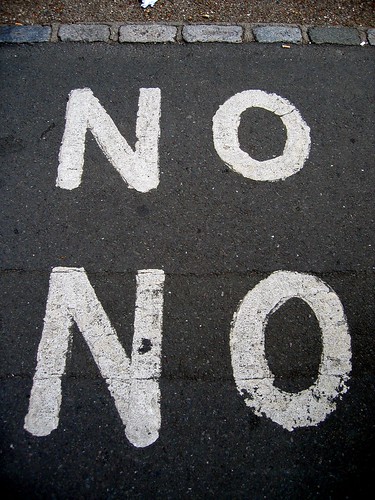 A lot of people don’t like Double Negatives and quite a number of people aren’t sure what they are.
A lot of people don’t like Double Negatives and quite a number of people aren’t sure what they are.
This article addresses both those concerns.
What is a Double Negative?
Simply put, a Double Negative is when you use a negative form of the verb along with a negative quantifier (see below for the most common quantifiers).
{negative verb} + {negative quantifier}
For example:
You are not going + nowhere.
She didn’t speak to + no one.
I didn’t do + nothing.
double negatives and math
Generally, double negatives are frowned upon as a sign of poor literacy and lots of people don’t like them because they think it sounds uneducated and working class. To justify this stance, they say that in math two negatives make a positive, for example:
-3 x -3 = +9
The logic of applying math to grammar is a little dubious to say the least. To refute the math = grammar argument you can simply point out that adding two negative numbers does not make them positive so why not adopt that rule for double negatives?
-3 + -3 = -6
So the next time someone talks about double negatives and brings math into it, you can safely ignore them.
double negatives and usage
Double negatives were common In Old English and Middle English. Whilst in “standard” English they’ve dropped out of use, they can still be heard in a number of modern dialects from AAVE to Norfolk.
Interestingly, many languages, (including Greek and Italian plus loads of others) allow double negatives in order to intensify the negation. For example:
Κανείς δεν μίλησε = no one didn’t talk
Non ho visto nessuno = I didn’t see no one
However, getting back to English, some people (to justify why we shouldn’t use them) like to say that logically two negatives cancel each other out. By saying
I didn’t do nothing.
This logically means that if you didn’t do nothing, you must have done something. LIkewise:
I didn’t see no one.
In other words, if you did not see nobody, you must have seen someone.
But all these so-called “logical” excuses for why we can’t have double negatives don’t really hold water. In the end it comes down to usage and prejudice.
Note, the same people who frown upon double negatives could quite well talk about using them as a “no-no”, but for them this doesn’t count as a double negative for some reason.
Double Negatives & TEFL
Because of the bias against double negatives in English (it still raises heated debate) it’s probably best if you teach your students that they should not use double negatives when they speak English.
If they trot out a few in an English exam, they are likely to be marked down for it.
Negative Words
The following words are regarded as negative. Using one in a clause will make the clause negative and so no negative verb is required:
- no
- not
- none
- nothing
- nowhere
- neither
- nobody
- no one
- hardly
- scarcely
- barely
Ideally these words should be taught as a set to your students.
photo credit: Abulic Monkey via cc


0 Comments